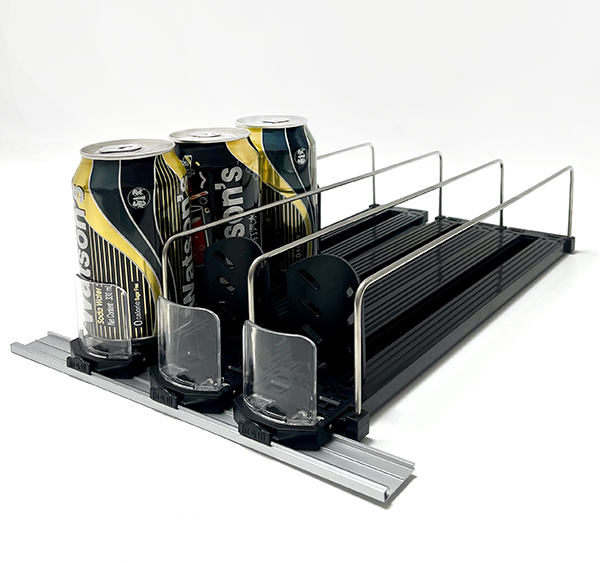Introduction
Imagine walking down an aisle and every product is perfectly aligned, easy to grab, and looks like it was just restocked. That’s not magic—it’s the power of automated display solutions.
Retailers are under constant pressure to maximize sales while minimizing labor. With increasing customer expectations and thinning profit margins, optimizing shelf space is no longer a “nice-to-have”—it’s a survival tactic.
This article explores one of the most talked-about display tools in modern merchandising. Whether you’re a supermarket chain, shopfitter, or a tech-driven retail brand, we’ll break down the benefits, costs, and real ROI of this solution—so you can decide if it’s the right move for your business.
Let’s dive in and see if this upgrade truly lives up to the hype.
Absolutely—let’s kick off the first five sections of the blog post with sharp SEO writing, smooth readability using bucket brigades, and zero keyword stuffing. Here’s the first part of your article:
Shelf Pusher Systems at a Glance
Let’s start with the basics.
If you’re not 100% sure what this tool does, you’re not alone.
At its core, this retail fixture is designed to keep products neatly faced at the front of the shelf—automatically. Instead of relying on staff to straighten merchandise, it uses a mechanical glide or spring system to do the job.
👉 Sounds simple? It is. But the effect on the shopping experience is massive.
These systems are especially common in supermarkets, convenience stores, and cosmetics sections where product presentation makes or breaks the sale. Whether you’re managing drinks, packaged snacks, or beauty items, keeping products front-and-center boosts visibility—and ultimately, sales.
The Hidden Costs of Messy Shelves
Let’s talk about what happens without automated organization.
You might not see the cost right away—but it’s there.
Poor Shelf Presentation Hurts Sales Quietly
Think about it: when customers see scattered, half-empty shelves, it feels like poor service or low quality. That hesitation? It often leads to them skipping the product entirely. Worse? It reflects on your store or brand image.
Labor Is Getting Pricier by the Minute
Every time a staff member has to tidy up shelves manually, it’s time not spent assisting customers or restocking. Multiply that over every aisle and shift—it adds up fast. These routine tasks quietly drain payroll budgets.
Shopper Fatigue = Missed Opportunities
Today’s shoppers want quick and effortless decisions. If they can’t find what they want fast—or if it looks like leftovers—they’ll move on. First impressions happen in seconds, and cluttered shelves don’t stand a chance.
The Real Benefits of Shelf Pusher Systems
Now let’s flip the script.
What happens when displays are always tidy, without lifting a finger?
Continuous Product Facing Without Extra Labor
When displays adjust themselves every time a product is picked up, your team doesn’t need to constantly patrol the aisles. That’s not just time saved—it’s a serious boost in operational efficiency.
Faster Stock Rotation = Fresher Goods
Especially in categories like food or beauty, shelf turnover matters. These systems help ensure that older stock gets purchased first. It’s a subtle but powerful way to reduce waste and increase sell-through rates.
A More Premium-Looking Store—Effortlessly
Uniform, front-facing displays just look better. They give off a vibe of order, care, and quality. And in retail? That’s gold. Shoppers associate clean, organized shelves with better value—even when the prices are the same.
Are Shelf Pusher Systems Expensive? Let’s Break It Down
You’re probably wondering: is this a big spend or a smart investment?
Let’s crunch some numbers and unpack the truth.
What You’re Really Paying For
Initial setup costs vary depending on product size, shelf type, and material. But remember, it’s usually a one-time investment. Unlike labor hours, which stack up endlessly, this is a fixed cost with long-term benefits.
Long-Term ROI That Goes Beyond Money
The return isn’t just financial. It shows up in employee satisfaction, faster shelf maintenance, reduced waste, and higher brand perception. These systems pull their weight in more ways than one.
Real-World Wins: Case Studies That Speak Volumes
Retailers who have adopted this tech report fewer out-of-stock events, cleaner displays, and even an uplift in impulse purchases. It’s not magic—it’s just smart merchandising done right.
Comparing Shelf Pushers to Manual Merchandising
Still on the fence?
Let’s put traditional methods head-to-head with automated solutions.
Manual Restocking: The Daily Grind
In a standard setup, someone has to “face” shelves multiple times a day. That means touching every product, row after row. It’s repetitive, inefficient, and—let’s face it—not the best use of skilled labor.
Pushers Save Time and Sanity
By doing the grunt work automatically, these systems free up staff for more valuable tasks like customer engagement or backroom logistics. It’s the equivalent of adding invisible hands to your store.
Better Use of Floor Space = Higher Sales per Square Meter
Because products stay aligned and organized, you can optimize space better—no weird gaps, no wasted facings. That tight, clean presentation often translates into higher revenue from the same footprint.
Let me know when you’re ready for the next sections!
Awesome! Let’s keep the momentum going. Below are the next sections, still clean on SEO, optimized for readability, and separated by bucket brigades just like you asked:
What Types of Products Work Best with This Solution?
Not sure if it fits your product line?
Let’s walk through which items thrive in this kind of display setup.
Best for Small to Mid-Sized Packaged Goods
These systems work like a charm for items like snacks, cosmetics, canned drinks, and toiletries. Basically—if it’s lightweight and needs to stay front-facing, you’re in the sweet spot.
Not Always Ideal for Large or Irregular Shapes
Oversized items or oddly shaped packaging may not move smoothly. In those cases, other merchandising tools like dividers or gravity-feed options might perform better. Always consider product compatibility during setup.
Flexible Solutions for Unique Product Lines
Don’t rule it out too fast. Many setups are customizable to fit niche product categories. If you’re dealing with boxed tech accessories, beauty kits, or impulse-buy items, a tailored system can still work wonders.
Shelf Pusher vs. Gravity Feed vs. Roller Track
There’s more than one way to automate product movement.
Let’s break down the key differences so you can make the right call.
Shelf Pushers: Best for Clean, Controlled Displays
They offer smooth, steady movement that keeps products perfectly aligned. Ideal for retail formats where appearance matters more than speed—think cosmetics, drinks, or electronics.
Gravity Feed: Simple, But Not Always Precise
This option relies on sloped shelves, using natural incline to slide items forward. It’s effective, especially in cold drink fridges or fast-moving snack sections, but can get messy if customers remove products too quickly.
Roller Tracks: Great for Heavy, Uniform Items
With built-in wheels, roller tracks reduce friction and are perfect for heavier products like cartons or bottles. They’re durable and efficient, but may be overkill for smaller items.
Are There Any Downsides You Should Know?
Let’s be real for a second.
No system is perfect—and knowing the potential drawbacks helps you plan better.
Misconception #1: “It’s Just a Fancy Add-On”
Some retailers skip this upgrade because they think it’s unnecessary. But they often overlook the cost of labor and missed sales from messy shelves. The long-term gain tends to outweigh the upfront spend.
Misconception #2: “They Break Easily”
Not all systems are built the same. Poor-quality materials wear out fast, especially with heavy usage. That’s why material choice (like PET plastic) makes a big difference in durability.
When It Might Not Be the Right Fit
If your store layout changes frequently or you sell mainly oversized items, the return might be lower. In those cases, hybrid solutions or adjustable setups might be the better route.
What to Look For in a Quality Supplier
Thinking about bringing this solution into your store?
Here’s what separates a good supplier from a great one.
Durable Materials Matter (Yes, Even the Plastic)
High-quality injection-molded plastic, like PET, holds up longer—especially in high-traffic areas. Look for suppliers that highlight material quality, not just price.
OEM & ODM Capabilities = Total Flexibility
If you want custom sizes, branded components, or unique design tweaks, you’ll need a supplier who can handle both OEM and ODM projects. It’s the best way to get a system that actually works for your products.
Don’t Overlook After-Sales Support
Things happen—products need tweaking, restocking, or expansion. Choose partners who offer reliable support and can deliver replacement parts fast when needed.
Real-World Results from Retailers Who Switched
Let’s move from theory to practice.
Here’s what real businesses have experienced after upgrading.
Supermarkets: Faster Resets, Higher Sales
Large chains report significantly faster shelf resets and fewer empty facings. The result? More consistent presentation—and yes, more revenue per foot of shelf.
Electronics Stores: Premium Feel, Less Clutter
Retailers selling gadgets and accessories saw improvements in both product visibility and perceived brand value. Customers noticed the cleaner look, and sales followed.
Food Brands: Reduced Waste, Happier Shoppers
With better stock rotation, many food brands saw fewer expired products and happier customers. Some even reported 10–20% boosts in product sell-through rates within the first few months.
Perfect! Let’s bring it home strong with the final two sections and a CTA that encourages action—still SEO-clean and reader-friendly all the way through:
Final Verdict: Are Shelf Pusher Systems Worth It?
Let’s wrap it all up.
If you’ve made it this far, you’re clearly considering the leap—so here’s the bottom line.
Yes—For Stores That Value Speed and Clean Presentation
If your shelves constantly need tidying, or if your team spends hours each week adjusting products, this is a no-brainer. It saves time, looks better, and drives a smoother customer experience.
Maybe Not—If Your Layout Is Always Changing
Highly dynamic setups, like seasonal pop-ups or stores with rotating product lines, might need more flexible display solutions. In those cases, lightweight alternatives or modular fixtures may work better.
But Overall? It’s a Smart, Scalable Upgrade
From boosting operational efficiency to enhancing your brand image, this system punches well above its weight. And in retail—where seconds matter—that can make all the difference.
Bonus: How Novaday Helps You Modernize Without the Stress
Still curious about making the switch?
Here’s how we make it easy for you.
Built with Durability in Mind
At Novaday, we specialize in PET injection solutions that are built to last. Our shelf accessories aren’t just strong—they’re built to handle real-world wear and tear in busy environments.
Full Customization—Down to the Last Millimeter
Whether you need a standard layout or something totally custom, our in-house R&D team is here to bring your vision to life. OEM and ODM projects are our bread and butter.
We’re Actively Seeking Partners Around the Globe
From supermarkets to shopfitters, we’re expanding our network of distributors and retail collaborators across Europe, North America, Australia, and South America. If you’re looking for a reliable manufacturer—let’s talk.
Ready to upgrade your retail display game?
👉 Reach out to Novaday today and let’s design a smarter shelf system together.
#RetailDisplay #VisualMerchandising #StoreEfficiency #RetailInnovation #Novaday
Let me know if you want a meta description or social teaser for this post!



